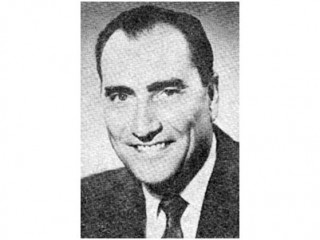
Tommy Durden biography
Date of birth : 1919-12-15
Date of death : 1999-10-17
Birthplace : Morgan County, Georgia
Nationality : American
Category : Famous Figures
Last modified : 2011-11-10
Credited as : guitarist, Heartbreak Hotel, composer
0 votes so far
Thomas Russell Durden was born on December 15, 1919, in Morgan County, Georgia, the youngest of seven children. His father was a cotton sharecropper, and he grew up in Jacksonville, Florida, where he learned to play Hawaiian slide guitar. Over time, he transferred this skill to the steel guitar and joined the Westernaires, a group that later played backup for Tex Ritter. In the mid-1950s Durden was living in Gainesville, Florida, and playing steel guitar for Smilin' Jack Herring and his Swing Billys. The band included Pee Wee Jenkins, Bob Chisolm, Herring, and steel guitarist Durden, and they worked as a country band, traveling from one dance hall to another in North Florida. It was during this time that Durden would write the lyrics to his most famous song, "Heartbreak Hotel," and in one story that survives, the Swing Billys were the first group to play the then-unknown song. The group, however, didn't like the song because it was a rock-n-roll number, and teased Durden about it. Durden, however, would have the last laugh.
The idea for "Heartbreak Hotel" came to him after reading an article in the Miami Herald. He had glanced at the front page before turning to the racing section, and saw a story about a man who had destroyed all of his identity papers and committed suicide. The well-dressed man had left behind a note reading, "I walk a lonely street." Durden thought the story had the potential to become a great song, so he drove over to see his songwriter friend Mae Axton (the mother of Hoyt Atxon). Axton had met Elvis Presley when he had performed in Jacksonville and had promised to write him his first million-seller.
Axton liked the song idea, so Durden sat down at the piano and started to improvise. Axton, thinking of the heartbreak of the man's family, suggested that there should be a "heartbreak hotel" at the end of the "lonely street." While writing the song, a third friend, Glen Reeves, dropped by, and Axton asked if he'd like to help with the composition. Reeves declined, saying that the title was silly. Reeves left to run errands, returning "an hour later to find the song completed and recorded by Durden on Axton's tape recorder," according to Albert Goldman in Elvis. Axton then asked Reeves, who was also known for his ability to impersonate Presley, to sing the song into the tape machine. If it was in a style that Presley could relate to, she believed, he would be more likely to consider it. Reeves recorded the song, and although he was offered one-third writing credit for his help, he once again refused. Durden would later note of Reeves's involvement, "I was convinced when I heard the record that Elvis was even breathing in the same places that Glen did on the dub."
Axton approached Presley with the song at the Nashville DJ (disc jockey) convention and he liked it so much that he asked her to play it several times until he had it memorized. Axton and Durden offered Presley one-third of the writing credit to sing the song, and in 1956 "Heartbreak Hotel" became his first single for RCA and his first number-one hit. "It's ironic," Goldman wrote, "that this now-legendary composition should have been offered to him by a couple of obscure writers who had never set foot inside the Brill Building." The song, however, caught on slowly. When Presley first performed what would become one of the most famous songs in rock history, an orchestra, complete with a trumpet solo, accompanied him. The studio version, however, quickly shot to number one. "Presley never recorded anything else remotely like it," wrote Michael Gray in the London Guardian. "Nothing so spooky, moody, jazz tinged or weird." The song was also one of the few Presley recorded at the time that had not been written by professionals.
While Durden continued to have a successful, if low-key, career, interviewers inevitably wanted to know about the role he had played in penning "Heartbreak Hotel." "He wrote more songs," noted Bruce Eder in All Music Guide, "but never anything ... as successful, but the one hit gave him a degree of financial security stretching out for more than 40 years, paying the rent a good deal of the time." Durden, however, had been surprised by the song's success, and later told the Chicago Sun-Times, "Evidently, it is a better song than I thought it was when I wrote it." When asked why he was never able to repeat the task of writing a number-one song, Durden was circumspect. "I have given it a lot of thought. I have come to the conclusion that the good Lord only allows one 'Heartbreak Hotel' to a customer."
Durden recorded two albums later in his career, Moods, which included his own version of "Heartbreak Hotel," and I Believe, which included religious songs. Durden retired from public appearances in the mid-to-late 1990s, and was inducted into the Michigan Country Music Hall of Fame in 1994. The Michigan Magazine Museum houses a number of artifacts central to his career, including his trademark pink tuxedo and a copy of the notes he and Axton made when writing "Heartbreak Hotel." Durden died at home on October 17, 1999, in Houghton Lake, Michigan.
















